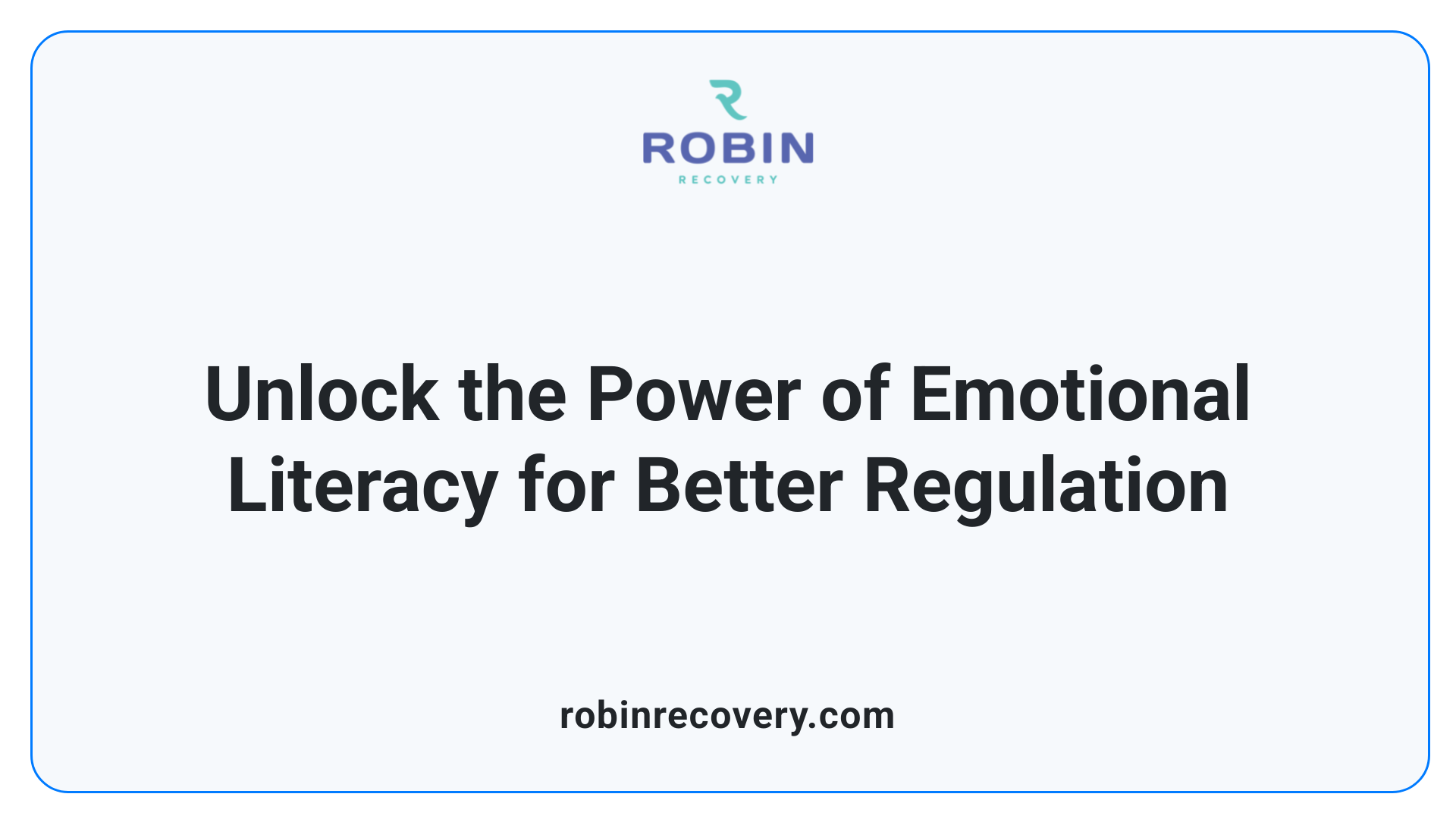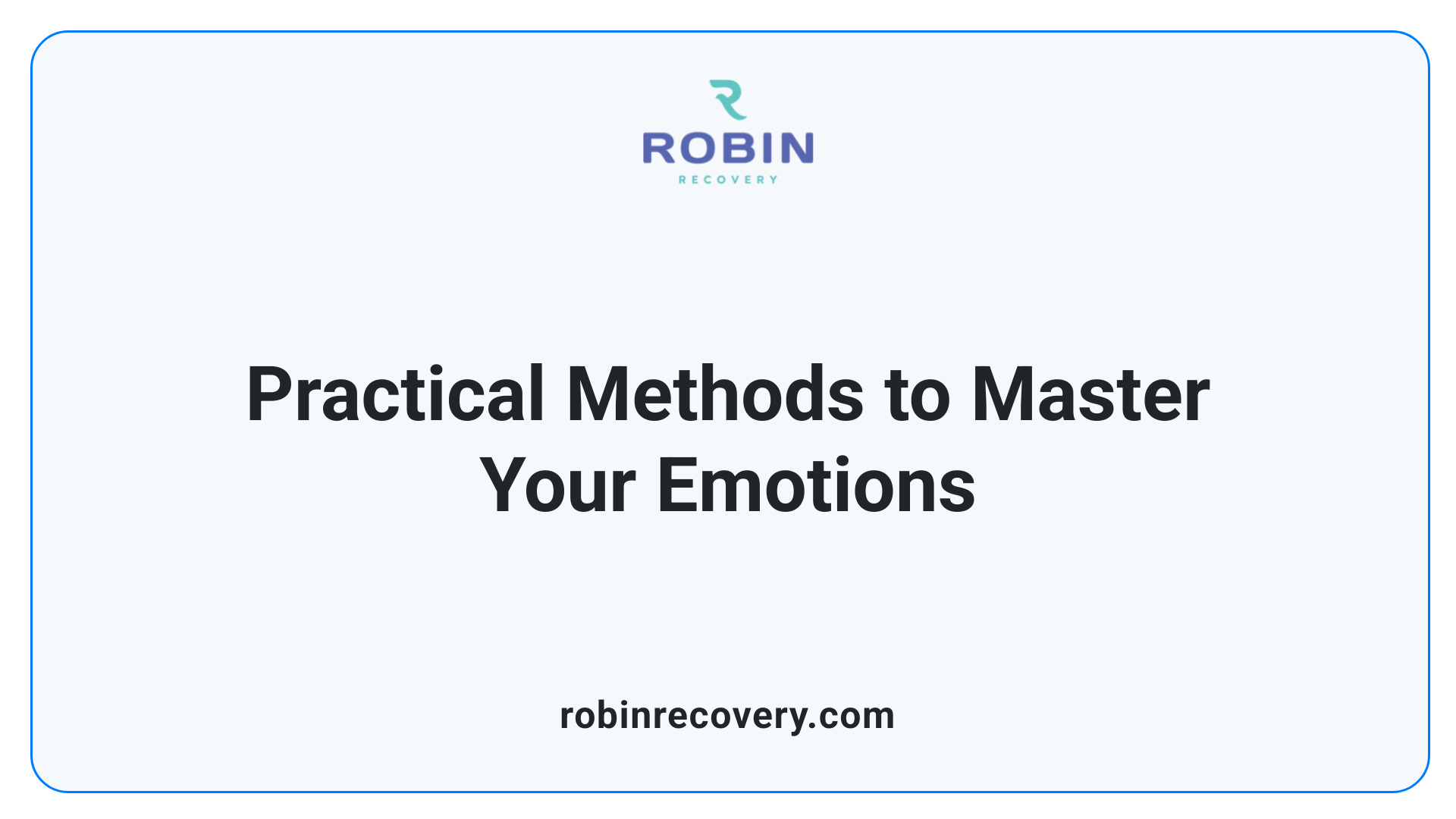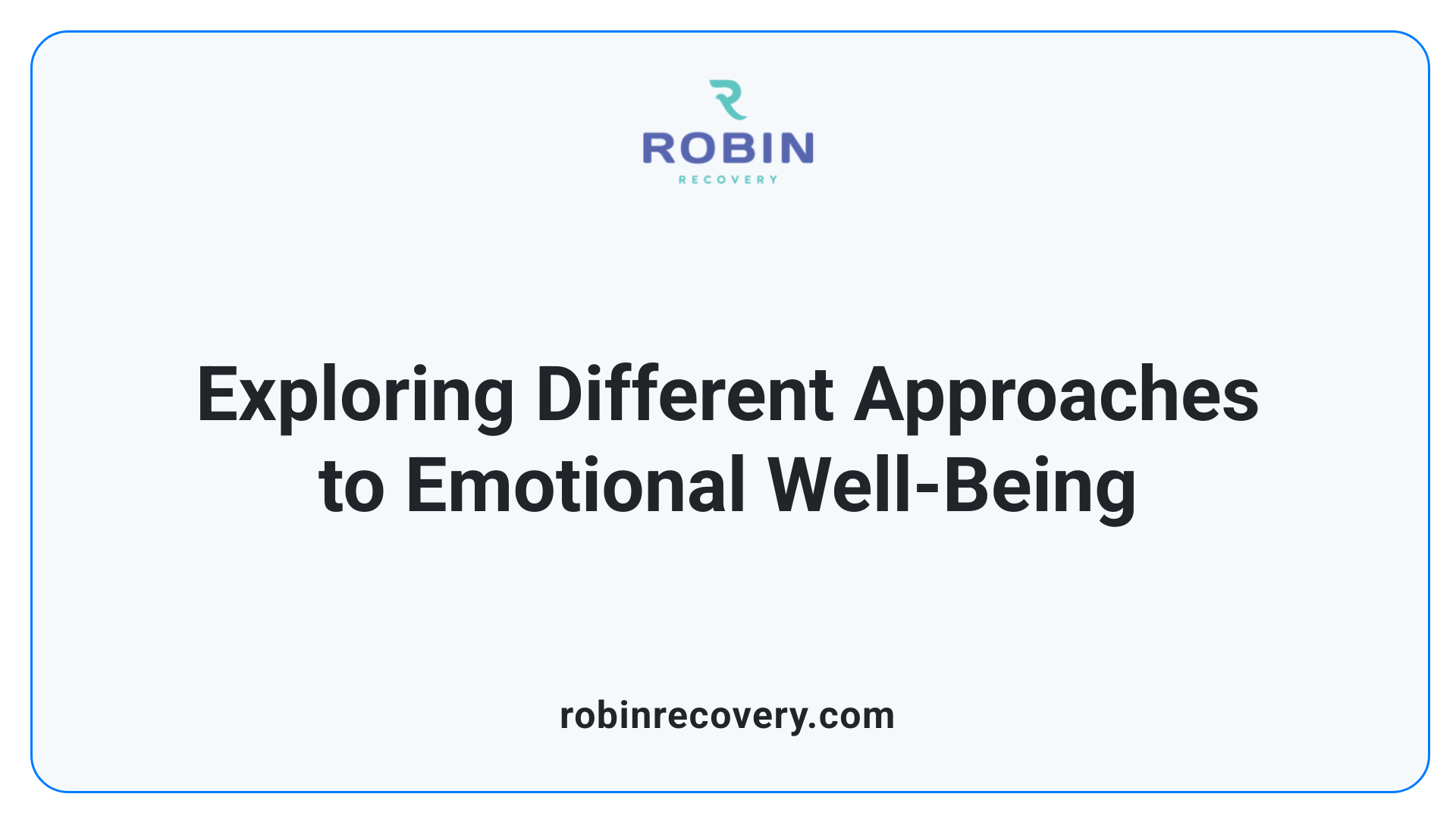How therapy helps individuals navigate difficult emotions

Understanding Emotional Regulation and the Role of Therapy
Emotional regulation is a vital component of mental health, encompassing the ability to manage and respond to emotional experiences effectively. Therapy plays a central role in equipping individuals with the tools necessary for this regulation, fostering healthier emotional responses, and promoting personal resilience. This article explores how various therapeutic approaches support individuals in understanding, managing, and transforming difficult emotions, backed by scientific insights into the neurological effects of therapy.
The Foundations of Emotional Understanding in Therapy

How does therapy help individuals identify and label their emotions?
Therapy plays a crucial role in teaching individuals to recognize and articulate their emotions. Many people struggle to understand what they feel or find it difficult to express their emotional experiences. Therapeutic approaches like cognitive-behavioral therapy (CBT) and emotional regulation therapy focus on improving emotional literacy by guiding clients to notice subtle emotional signals and assign accurate labels to their feelings. Through techniques such as journaling, mindfulness, and guided reflection, individuals learn to distinguish between different emotions like anger, sadness, anxiety, or frustration.
This process helps clarify what's going on beneath the surface, making emotions more manageable. When people can accurately identify their feelings, they are better equipped to respond appropriately rather than react impulsively. Labels such as 'I am feeling overwhelmed' or 'I am experiencing fear' foster greater self-awareness and lay the foundation for healthier emotional responses.
Why is emotional awareness important for regulation?
Emotional awareness is fundamental to effective regulation. Recognizing and understanding one's emotional state acts like a compass that guides appropriate responses to life's challenges. When individuals can pinpoint their feelings, they gain insight into their triggers and reactions.
In therapy, developing this awareness involves paying attention to physiological cues, thoughts, and behavioral responses associated with emotions. Techniques like mindfulness and acceptance strategies help clients stay present with difficult feelings without judgment. This mindful awareness prevents emotions from escalating uncontrollably and enables timely use of regulation strategies like deep breathing, cognitive restructuring, or self-compassion.
Furthermore, emotional awareness fosters empathy and improves interpersonal relationships. As clients become more attuned to their own feelings, they also learn to recognize and respect others' emotions, enhancing social interactions.
How can therapy support emotional understanding, awareness, and the development of coping skills?
Therapy offers a personalized and structured environment where individuals can explore their emotional worlds safely. Therapists utilize various modalities—such as CBT, Dialectical Behavior Therapy (DBT), or Acceptance and Commitment Therapy (ACT)—to help clients develop practical skills for managing difficult emotions.
One essential aspect is helping clients to cultivate emotional literacy—being able to identify, label, and interpret feelings accurately. This foundation allows for more tailored coping strategies. Techniques like cognitive reappraisal enable rethinking distressing thoughts, while mindfulness promotes observing emotions without becoming overwhelmed.
Practical tools accompanying therapy include deep breathing exercises, gratitude journaling, engaging in physical activities, and seeking social support. These strategies build resilience over time, enabling clients to handle stress more effectively.
Additionally, expressive arts or reflection activities deepen understanding by connecting feelings with personal values and experiences. Together, these approaches help not just in alleviating immediate distress, but in fostering long-term emotional stability and growth. Overall, therapy empowers individuals to comprehend their emotions better and equips them with the skills needed to navigate life's emotional landscape with confidence.
Techniques and Strategies for Emotional Regulation

There are several practical techniques and strategies used in therapy to help individuals better manage their emotions. Mindfulness practices are central, encouraging present-moment awareness and non-judgmental observation of emotional experiences. This helps reduce reactivity and fosters a calmer state of mind.
Cognitive restructuring and reappraisal are techniques that challenge and change unhelpful thought patterns, promoting healthier emotional responses. By examining the accuracy of thoughts and reframing negative beliefs, clients learn to respond more adaptively to difficult situations.
Deep breathing exercises serve as a physiological calming tool, decreasing arousal and tension. Techniques such as diaphragmatic breathing or progressive muscle relaxation help individuals recover from intense emotional episodes.
Dialectical Behavior Therapy (DBT), a widely used approach for emotion regulation, offers specific skills like distress tolerance and interpersonal effectiveness. Distress tolerance techniques include acting opposite urges (doing the opposite of what feels impulsive), checking the facts to question assumptions, and focusing on positive or neutral events to shift attention away from distressing feelings.
Another important aspect is recognizing primary versus secondary emotions. Primary emotions are immediate responses to an event—such as anger or sadness—while secondary emotions are reactions to primary feelings, often involving shame or guilt. Identifying these helps clients understand their emotional landscape better and develop targeted coping strategies.
Overall, these evidence-based methods aim to improve emotional awareness, reduce impulsivity, and build resilience. By integrating mindfulness, cognitive skills, and physiological calming techniques, therapy helps individuals regain control over their emotional responses and enhance their mental wellbeing.
Diverse Therapeutic Modalities for Emotional Management

What are the main types of therapy used to help with emotional management, and how do they differ?
Various therapy approaches are designed to support individuals in managing their emotions more effectively. Each modality has a unique focus and technique, catering to different needs and preferences.
Cognitive Behavioral Therapy (CBT) is one of the most common forms. It helps clients identify and challenge unhelpful thoughts and behaviors that contribute to emotional difficulties. By changing these patterns, individuals can experience improved mood and resilience.
Emotion-Focused Therapy (EFT) centers on increasing emotional awareness and processing. It encourages clients to explore their feelings deeply, understand their emotional experiences, and transform maladaptive emotions into healthier ones.
Acceptance and Commitment Therapy (ACT) promotes acceptance of internal experiences such as negative thoughts and feelings. It emphasizes clarifying personal values and committing to actions that align with these values, facilitating psychological flexibility.
Dialectical Behavior Therapy (DBT) combines elements of CBT with mindfulness and distress tolerance skills. It is particularly effective for managing intense emotions and impulsive behaviors through techniques like breathing exercises, emotional regulation strategies, and interpersonal effectiveness.
Psychodynamic therapy investigates underlying emotional conflicts often rooted in past experiences, helping individuals understand how these subconscious influences shape current emotional responses.
Mindfulness-based therapies cultivate present-moment awareness and nonjudgmental acceptance of thoughts and feelings. These approaches aim to reduce reactivity and promote emotional balance.
While these therapies differ in methods—ranging from cognition, emotion processing, acceptance, or mindfulness—they all work toward enhancing emotional regulation. They help build resilience, reduce symptoms of mental health conditions, and foster overall well-being.
How Therapy Facilitates Emotional Regulation and Difficult Emotion Management

How does therapy help individuals manage and regulate difficult emotions?
Therapy plays a crucial role in helping individuals navigate challenging emotional experiences. It encourages self-awareness by enabling clients to recognize and label their feelings, which is fundamental for effective regulation. Through various approaches like Cognitive-Behavioral Therapy (CBT), Dialectical Behavior Therapy (DBT), and Emotion-Focused Therapy (EFT), clients learn practical skills to influence their emotional reactions. For instance, mindfulness exercises help maintain present-moment awareness, while cognitive restructuring assists in challenging negative thoughts.
Additionally, therapy enhances emotional intelligence— the ability to perceive, understand, and manage feelings— improving interpersonal relationships and personal resilience. Techniques such as exposure therapy allow clients to gradually confront traumatic memories, reducing their emotional power, while trauma-focused interventions aid in tolerating distress associated with grief, anxiety, or life transitions. Overall, therapy offers a safe space for emotional processing and equips individuals with tools to regulate intense feelings, fostering healthier mental patterns and emotional stability.
Benefits and Long-Term Outcomes of Therapeutic Emotional Interventions
What are the benefits and outcomes of therapeutic interventions for managing difficult emotions?
Therapy offers significant advantages for individuals struggling with challenging emotions. A primary benefit is the improvement in emotional understanding and regulation. Through various techniques like cognitive restructuring, mindfulness, and emotion-focused approaches, individuals learn to identify, label, and manage their feelings more effectively. This increased awareness helps reduce impulsive reactions and promotes healthier responses.
One of the key outcomes is enhanced resilience—an individual’s ability to recover from setbacks and adapt to stressors. Therapy fosters personal growth by developing self-awareness, compassion, and adaptive coping skills, which contribute to greater emotional stability and mental well-being.
Moreover, therapeutic interventions often lead to a decrease in emotional distress. By addressing underlying thought patterns and emotional triggers, therapy reduces issues like anxiety, depression, and maladaptive behaviors such as mood swings and impulsivity.
Research points to long-lasting changes in brain structure and biochemical processes due to therapy. Techniques like Dialectical Behavior Therapy (DBT) and Cognitive-Behavioral Therapy (CBT) have been shown to modify activity in brain regions involved in emotion regulation, such as the prefrontal cortex and amygdala. These neurobiological changes support sustained emotional stability and resilience.
Overall, therapy empowers individuals to master their emotional responses, handle stress more effectively, and experience a more balanced and fulfilling life. The benefits extend beyond immediate symptom relief, fostering long-term mental health stability and personal development.
Benefits of Therapeutic Interventions Outcomes Additional Details Improved emotional understanding Better regulation of feelings Techniques include labeling emotions and cognitive reappraisal Increased resilience Faster recovery from stress Builds adaptive coping skills and self-compassion Reduction in emotional distress Decreased anxiety and depression Addresses maladaptive thought patterns Neural and biochemical changes Lasting brain alterations Structural modifications in brain regions involved in emotion control Personal growth Enhanced self-awareness Promotes healthier relationships and self-esteem
Engaging in therapy not only alleviates immediate emotional issues but also sustains long-term mental health improvements, helping individuals to face future challenges with greater confidence and emotional strength.
Processing Trauma, Grief, Anxiety, and Life Changes through Therapy
How can therapy help individuals process trauma, grief, anxiety, and life transitions?
Therapy offers a safe and nurturing space where individuals can openly explore their complex emotional experiences related to trauma, grief, anxiety, and significant life changes. This environment, built on trust and confidentiality, allows clients to express feelings they might find difficult to share elsewhere.
Different therapeutic approaches—such as trauma-focused therapy, grief counseling, and cognitive-behavioral therapy—equip individuals with effective coping skills. These techniques help in understanding and managing overwhelming emotions, reducing emotional intensity, and fostering emotional stability.
Practical tools like grounding exercises, journaling, and specific trauma interventions like Eye Movement Desensitization and Reprocessing (EMDR) play crucial roles in treatment. Grounding exercises help reconnect individuals with the present moment, decreasing anxiety and emotional distress. Journaling provides a channel for emotional expression and cognitive processing, helping clients articulate and make sense of their feelings.
Trauma-focused therapies aim to address the emotional charge of traumatic memories, enabling clients to process these memories adaptively. EMDR, in particular, facilitates the reprocessing of traumatic events, lessening their psychological impact. These methods can lead to improved emotional regulation and overall healing.
Addressing underlying issues such as trust problems, negative self-beliefs, and feelings of low self-worth is integral to therapy. When these issues are explored and actively worked through, individuals can rebuild their confidence and develop a more positive self-view.
This supportive therapeutic process encourages resilience, helping individuals to adjust more effectively to life’s upheavals. It fosters hope, personal growth, and the ability to face future challenges with increased emotional strength.
Technique Purpose Additional Details Grounding exercises Reduce emotional distress and stay present Involves sensory awareness to anchor in the here and now Journaling Express and process feelings Helps articulate thoughts, reflect on emotions EMDR Reprocess traumatic memories Facilitates neural pathways to diminish emotional charge Trust-building activities Rebuild trust and self-worth Improve interpersonal relationships and self-esteem
Therapy's comprehensive approach, combining emotional exploration with practical techniques, provides individuals pathways to healing, growth, and resilience amid life's difficult transitions.
Building Resilience and Fostering Personal Growth through Therapy
How does therapy contribute to resilience building and personal growth through emotional challenges?
Therapy plays a vital role in enhancing resilience and encouraging personal development, especially when facing emotional difficulties. It provides a secure environment for self-exploration, where individuals can understand their emotional responses without judgment. This understanding helps them identify negative thought patterns and develop healthier ways to cope.
Many therapeutic techniques focus on building emotional regulation skills, such as cognitive restructuring, mindfulness, and emotional awareness exercises. These methods increase self-awareness, foster self-compassion, and promote a growth mindset—the belief that skills and qualities can develop over time.
A crucial aspect of therapy is supporting individuals in setting meaningful goals and establishing healthy boundaries with others, which contribute to emotional independence and strength. Strengthening social support networks is also emphasized, as positive relationships offer emotional safety and encouragement during challenging times.
Developing emotional resilience involves managing stress effectively, recovering quickly from setbacks, and maintaining confidence in one's ability to handle future difficulties. Therapy equips individuals with practical skills and insights to face life’s obstacles more effectively.
Ultimately, therapy nurtures a mindset geared towards growth and adaptation. It encourages ongoing self-improvement, helping people to learn from experiences, build inner strength, and maintain psychological well-being even amid adversity.
Aspect of Resilience Techniques and Focus Areas Outcomes Self-exploration & self-compassion Mindfulness, emotional awareness Greater self-understanding and kindness Growth mindset & goal setting Cognitive restructuring, motivational interviewing Confidence and purpose Support networks & boundaries Relationship skills, boundary-setting exercises Healthy, supportive relationships Developing emotional resilience Stress management, coping strategies Adaptability and recovery
By integrating these approaches, therapy builds a robust foundation for resilience, helping individuals thrive through emotional challenges and pursue meaningful personal growth.
Neuroscientific and Theoretical Foundations of Emotional Regulation in Therapy
How does therapy influence the neurological and scientific aspects of emotional processing?
Therapy impacts the brain's emotional regulation system primarily through neuroplasticity, which is the brain's ability to change and adapt as a result of experience. During therapeutic sessions, individuals often learn new skills and coping strategies that lead to structural and functional changes in key brain regions.
A significant focus is on the interplay between the prefrontal cortex and the amygdala. The prefrontal cortex acts as the brain's executive supervisor, managing decision-making, impulse control, and regulating emotional responses. The amygdala processes fear and threat-related stimuli, often triggering emotional reactions. Effective therapy, especially approaches like Cognitive-Behavioral Therapy (CBT), strengthens the connectivity between these areas. This enhanced communication allows for better top-down regulation of emotions, reducing impulsive reactions and calming hyperactive threat responses.
Neurochemical changes also occur through therapy. For instance, the release of neuropeptides such as oxytocin fosters social bonding and emotional resilience. Endorphins and serotonin levels can increase, contributing to improved mood and stress regulation. These chemical shifts support emotional stability and are often enhanced by the supportive, trusting relationships developed in therapy.
Several theoretical frameworks help explain these processes. Gross’s process model describes emotion regulation as occurring through antecedent-focused strategies (like reappraisal) and response-focused strategies (like suppression). Therapy often promotes these strategies, influencing neural circuits involved in processing emotions.
Additionally, the polyvagal theory underscores the role of the autonomic nervous system in emotional states. It emphasizes how vagal tone influences our ability to social engage or retreat from stress. Therapeutic techniques, especially those involving mindfulness and calming exercises, can activate the vagus nerve, promoting calmer emotional states.
Together, these neurobiological and theoretical insights reveal that therapy does more than change thoughts and behaviors; it induces tangible, lasting changes in brain structure, chemistry, and autonomic regulation. This scientific foundation underscores the profound impact therapy can have on how individuals process and respond to emotions, leading to improved mental health and resilience.
Harnessing the Power of Therapy for Lasting Emotional Wellness
Therapy offers a comprehensive approach to managing difficult emotions by fostering understanding, developing practical skills, and inducing neurobiological changes that support emotional health. Through various modalities, individuals learn to navigate their emotional landscapes with greater resilience, leading to lasting well-being. The scientific insights into how therapy reshapes the brain, combined with personalized strategies, underscore its vital role in emotional regulation and mental health. Embracing therapy as a pathway to emotional mastery can profoundly transform lives, helping people face life’s challenges with confidence, compassion, and resilience.
References
- How Therapy Helps You Regulate Your Emotions
- Mastering Everyday Life with Therapy for Emotion Regulation
- Science Behind Therapy | Mental Health America
- Understanding psychotherapy and how it works
- Cognitive behavioral therapy - Mayo Clinic
- The Transformative Power of Counseling: Coping Through Tough ...
- The Power of Therapy: How Counseling Can Mental Health
